IPADS-ZEF talk their perspectives on global interdisciplinary and transdisciplinary collaboration
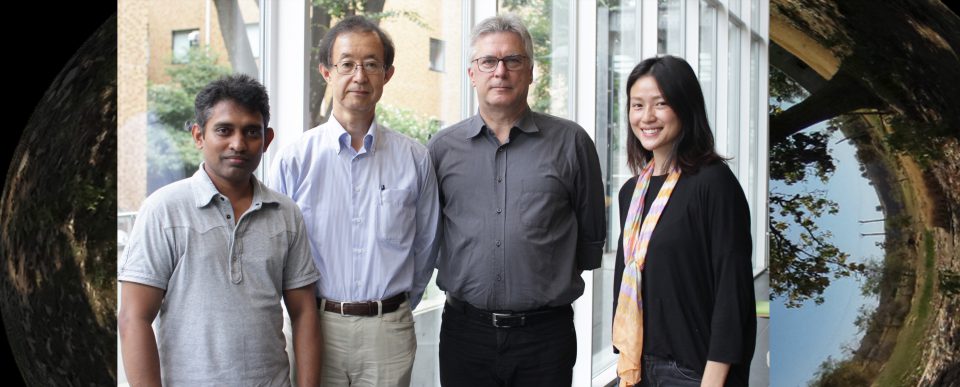
“Working together for agricultural development – how will working across regions, sectors and disciplines improve the lives of the rural poor?
The call for global collaboration, interdisciplinary and transdisciplinary approaches are often echoed in conferences and publications despite the difficulty in applying research findings across different regions, disciplines and sectors. Professor Manfred Denich of University of Bonn, Professor Kensuke Okada of University of Tokyo and University of Tokyo PhD candidate Nuwan DeSilva discuss their thoughts on the importance of global interdisciplinary and transdisciplinary collaboration in achieving their vision for agricultural development.
What could be – the future of agricultural development
Our perception of smallholder farms needs to change. Judging from the articles that make it to our news feed, agriculture is a dichotomy – big ag (large multinational agricultural companies) benefiting from technological innovation and economies of scale and smallholder farmers struggling to keep food on the table despite long hours of hard labor under harsh conditions. It’s true, smallholder farmers face limitations that are nonexistent for industrial farms – but if managed sustainably, they too can be highly productive. A large study conducted on over 280 projects across more than 37 million hectares in 57 developing countries found that smallholder farms can be efficient – crop yields increased by 79% when sustainable practices were adopted by the farmers (Pretty et al, 2008).
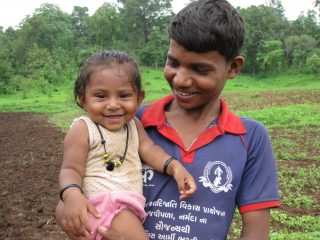 Taking into account the number of employment opportunities and the portion of food supply that smallholder farms provide in South America, sub-Saharan Africa and Asia, researchers find a worthy cause in agricultural development. Professor Okada’s vision for the future of agricultural development goes well beyond food, “yes, crop yields are important but it’s not just about meeting the minimum daily calorie quotas – people want more nutritious food, better medical services and a safer environment to live in. Also, displacement is a serious problem of our time and agricultural development has a role to play in alleviating the issue.”
Taking into account the number of employment opportunities and the portion of food supply that smallholder farms provide in South America, sub-Saharan Africa and Asia, researchers find a worthy cause in agricultural development. Professor Okada’s vision for the future of agricultural development goes well beyond food, “yes, crop yields are important but it’s not just about meeting the minimum daily calorie quotas – people want more nutritious food, better medical services and a safer environment to live in. Also, displacement is a serious problem of our time and agricultural development has a role to play in alleviating the issue.”
Project teams have evolved to better serve farmers
Transforming the vision into action is difficult, especially for such a site-specific sector. “Cooperation between extension workers, scientists and farmers is not as close as you would imagine. Scientists don’t often work directly with farmers – as was the case for my Ghanaian project years ago.” Despite this, Professor Okada engaged with farmers and recalled a conversation with a young farmer who opened up about concerns, “he told me that he noticed his crop was patchy and sought to apply more fertilizer in areas that had less growth. The local extension worker noticed and stressed that he should apply fertilizer uniformly across the plot even though there was inconsistent growth. The young man asked me “was I wrong?”.” If applied correctly, science and technology can lead to sustained improvements in crop yields but it’s evident that science and technology alone can only go so far. It turns out the extension worker had simplified the situation by ignoring site-specificity of crop management and relied solely on general information provided by training centres. Although the farmer intuitively knew what to do, he was not equipped with the tools to independently determine the appropriate quantity of fertilizer to use.
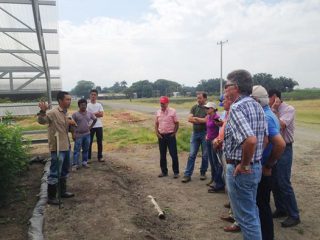
Scientists who receive funds from agricultural development agencies are increasingly asked to demonstrate the effectiveness of their research. Professor Denich has worked on both types of projects where “natural scientists have either taken additional roles by performing public relations and extension services or just focused on the science side of things while collaborating with dedicated public relations and extension service professionals to bring about change”. He stresses that “it’s important to involve extension workers – they show us the parts of our findings that are relevant for farmers. When we look beyond one specific project, it becomes apparent that an interdisciplinary approach is necessary to maintain the project’s integrity.” As Okada-sensei mentioned, agricultural development is multifaceted. If researchers develop tunnel vision, we’ll miss the big picture. We need ecologists to look at the environmental aspects, agronomists to look at the fields, social scientists to assess the impact the research has on the community and the associated economic consequences and extension workers to communicate with farmers. Everyone should be aware of what’s happening in other fields but focus on their own – only then will we be able to further agricultural development holistically”.
There has been a shift to involve third parties in the implementation stage of agricultural development programs. A Japan International Cooperation Agency (“JICA”) funded, IPADS-run rice project in Colombia demonstrates how market-driven initiatives and transdisciplinary involvement can work in the favor of farmers. In some Latin American countries, government extension services were ineffective and replaced by Rice Producers Association (“RPA”), a privately-run NGO. Regular progress meetings that were held under the scrutinizing eyes of funders and the government ensured that RPA remained effective and helped the farmers solve their problems.
Involving the private sector is inevitable
Markets and the private sector play increasingly important roles as smallholder farmers grow beyond subsistence farming and are able to sell excess produce to generate income. Professor Okada shared a story of a smallholder farm in northern Ibaraki (Japan) that he visited on a field excursion with some IPADS students “the organic farm is located in northern Ibaraki. Despite being a small operation, the farmer was earning good money from his diversified crops. He played around with his business model, experimented with his marketing strategy and found a niche.” Admittedly, the said farm has good access to retail consumers and could sell produce online or even drive to Tokyo’s fruit and vegetable markets.
Farmers in remote areas are robbed of such options. During a research project in the Amazon, Professor Denich saw that diversification is limited by the marketing capacity of the farmer, “we need to be careful not to recommend diversification if the marketing strategies for the different crops go beyond the farmer’s capacity. For examples, papaya is a great fruit for Amazonian farmers to grow but the fruits spoil within a few days. If they don’t have transport and marketing channels that deliver the fruits to consumers in time, they will be worse off.”
Knowledge transfer and encouraging the next generation of agricultural scientists to develop a flexible attitude
Although specific research findings cannot always be directly applied across regions, knowledge transfer at the academic level is achievable. Global collaboration leads to more ideas and minimises duplication – especially so if developing and developed countries are in question.
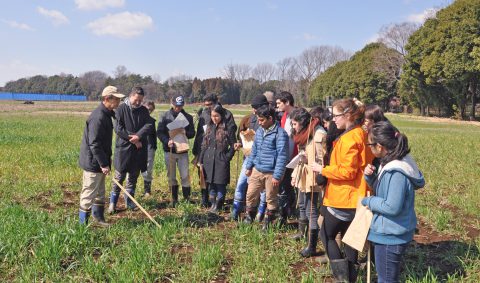
It is then up to academia or other practitioners to distill the information and tweak it to suit local situations. Professor Denich believes the best way to do so is to broaden skillsets, “aiming for T-shaped would be a great start – knowing one specific area in great detail and having broad knowledge across various disciplines is necessary for a holistic approach in solving problems and that’s what we should aim for. It’s also very important to engage the Global South as much as possible and provide education opportunities. The students (from developing countries) that come to Germany to study will return to their home countries and become leaders in their field.”
The ZEF and IPADS program comprises interdisciplinary courses in the first year of their doctoral and masters program, respectively, and allocates the following years toward research for the dissertation. “Our courses aim to train aspiring professionals in agricultural development to analyse situations in a systematic way and to take into account farmers’ views and other information”. Nuwan agreed that the interdisciplinary nature of the courses and the transdisciplinary aspect of the research projects were what attracted him to IPADS. “I’m currently working on wheat projects with Okada-sensei but my background is quite diverse. After completing an undergraduate degree in animal science, I worked in the Sri Lankan branch of the Food and Agriculture Organization of the United Nations (“FAO”) for a few years before moving onto a private firm in the marketing sector. I’m also really enjoying the cultural diversity here.” A quick look at students in the IPADS and ZEF program show that Nuwan is right – there’s plenty of diversity in culture, disciplines and interests among the students.
The interview was conducted by LUI Florence Hiu Yan, 2nd year master’s student, IPADS
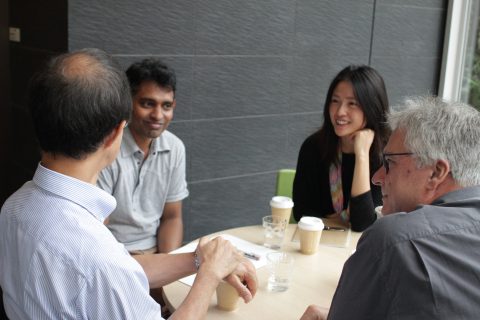
Professor Kensuke Okada
University of Tokyo
Graduate School of Agricultural and Life Sciences, IPADS
Research interests: Plant Science, soil fertility management, crop growth model
Regions: Africa, Asia and South America
Link: https://ipads.a.u-tokyo.ac.jp/staff/detail.php?id=23
Professor Manfred Denich
University of Bonn
Centre for Development Research
Research interests: Conservation and use of biodiversity, agroforestry systems, bioenergy
Regions: South America, Asia, Africa
Nuwan DeSilva, PhD candidate
University of Tokyo
Graduate School of Agricultural and Life Sciences, IPADS
Research interests: Crop science
===
Please note that ZEF has a doctoral studies program, but no masters program.